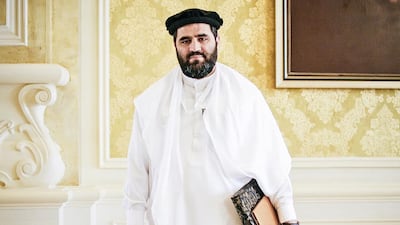ABU DHABI // Thirty-two Afghan imams are taking home the lessons they learned on women, moderate Islam and social harmony after completing a two-week Islamic course in the capital.
As part of a UAE project to rebuild Afghanistan, religious officials in the emirate have been providing courses for their Afghan counterparts.
The courses have been ongoing and to date about 17,000 Afghan imams have been trained by UAE experts. “The plan is to train 20,000,” said Faiz Osmani, the Afghan minister of Haj and religious affairs.
As a follow-up to the training courses conducted in Afghanistan, trainees take a two-week course run by Zayed House for Islamic Culture. It is taught by the Authority of Islamic Affairs & Endowments (Awqaf) preachers in the UAE and the first batch graduated on Thursday.
While the training focuses on such areas as scientific research, accepting others, dialogue, the peaceful message and manners of Islam, the trainees were mostly surprised by the active role women should play, said Awqaf head Dr Mohammed Al Kaabi.
“Our view of women as Muslims should be as Allah ordered, so they were educated on the role of women in building societies,” he explained, “[A woman] created heroes, men and civilisations, so she should not be marginalised. She has to participate in society and has rights and obligations alike.
“We focused on this notion the most,” said Dr Al Kaabi, because in Afghan society women lacked prominent roles outside their homes.
The correct definition and analysis of other notions were also provided, such as takfir, jihad, caliphate, the importance of the ruler and stability.
Similar courses have been held for imams from the US and in Britain.
“The imams received excellent training on the moderate approach in preaching,” said Mr Osmani. “This project has great influence in organising fatwa and Friday sermons, spreading knowledge and forgiveness in Afghanistan.
“We were in urgent need for a programme like this. In the UAE, there are 120 different nationalities living in harmony and this is what we need in Afghanistan right now with the current circumstances.”
Graduate Abu-Huthaifa Abdulraheem was surprised to see men and women working together and different nationalities living in harmony.
“We got to know the UAE culture and how the people live in a mixed environment between men and women,” he said. “We learnt that Islam is not a religion of war or extremism.”
Hafiz Salam, a 37-year-old private tutor in Islamic studies and an employee at the Awqaf ministry in Afghanistan, said the main meaning of the issues did not change for him.
“What we saw during the two weeks is new and advanced. It was for public preaching and the importance of the sermon in society to establish stability and security,” he said.
“We took valuable lessons from the scholars on Friday sermons and Islamic principles that we will take with us to our country.”
The lessons included ethics and manners of the preacher, his influence in bringing the people together, and development of the country.
hdajani@thenational.ae


